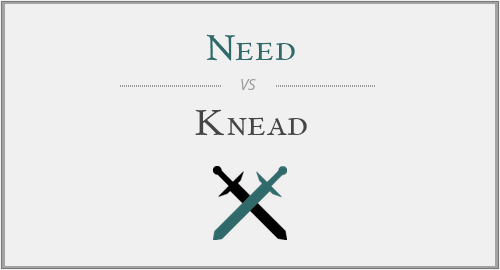I need to knead this dough before noon today.
Though very common in English language, knead and need are two homophones that sound exactly alike but their meanings are entirely different. This remarkable resemblance in their pronunciations sometimes, results in confusion while writing and speaking either one of them. The early English learners have difficulty in remembering which homophone meant what and this is precisely what we will help you with. This article will make you understand the meanings, usage and difference between both homophones and how to tell one apart from the other.
Origin:
Need originated from Old English nēodian (verb), nēod, nēd (noun), of Germanic origin; related to Dutch nood and German Not ‘danger’. Knead originated from Old English cnedan, of Germanic origin; related to Dutch kneden and German kneten.
Need as verb:
Need is used as a verb in English language where it means to require (something) because it is essential or very important rather than just desirable. I need your help with something. Need is also used to refer to not wanting to be subjected to something. I don’t need your advice, thank you! Another meaning of need as verb is to express necessity or obligation.
You needn't come if you don't want to.
Need as noun:
Need is also used as a noun in English language where it means circumstances in which something is necessary. Man’s basic need of food, shelter and clothing must be fulfilled. Need is also used to describe a thing that is wanted or required. You need to work hard to get there. When referring to the state of requiring help, or of lacking basic necessities such as food, need is used as a noun.
You help us in our hour of need and we will not leave you alone in yours.
Knead as verb:
Knead is used as a verb to describe the action of work with moistened flour or clay into dough or paste with the hands. Making (bread or pottery) by kneading flour or clay is also called kneading. Turn the dough on to a floured board and knead. The act of messaging or sqeezing with hands is also known as kneading.

He asked her to knead his back.
Examples:
Motherless babies could be on the horizon after scientists discovered a method of creating offspring without the need for a female egg. (The Telegraph)
But while it’s easy to be lured by the size and scale of green bond issuances in China, analysts say some matters need to be addressed before they become a meaningful financing tool. (The South China Morning Post)
Knead in some of the flour from the work surface, adding a little more if the dough remains sticky. (The Swindon Advertiser)
“While suffering years of back pain I grew frustrated with the regular foam roller which couldn’t effectively target and knead out my upper & lower back muscles. (The Clare Herald)
Need vs. Knead:
When you work with dough by your hands, you knead it. When you require a certain ingredient, say sugar, for making something, say cake, you need it. You need sugar to make cake and you knead the dough before baking it. Knead with a silent k at its beginning is the one related to dough.
Do you need any more guidance to understand the difference between need and knead?




Have a discussion about this article with the community:
Report Comment
We're doing our best to make sure our content is useful, accurate and safe.
If by any chance you spot an inappropriate comment while navigating through our website please use this form to let us know, and we'll take care of it shortly.
Attachment
You need to be logged in to favorite.
Log In